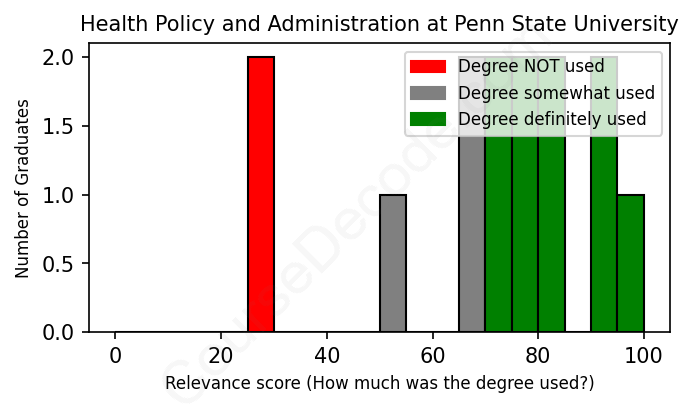
First, some facts. Of the Health Policy and Administration graduates from Penn State University we've analyzed , here's how many have used (or NOT used) their degree in their career:

These are estimates based on AI analysis of 14 LinkedIn profiles (see below).
The verdict? Slightly above average. Overall, with an average relevance score of 70%, Health Policy and Administration graduates from Penn State University have a slightly higher likelihood (+3%) of finding work in this field compared to the average graduate across all fields:
And for comparison, here's the chart for all profiles we've looked at across all degrees.
Also, after graduating, 50% of these graduates have pursued further education other than another Bachelor's degree (such as a Masters degree or other), compared to the average across all profiles of 35%. This suggests you may need more than just a Bachelors degree to be competitive as a Health Policy and Administration graduate.
See the details:
|
Relevance score: 78% We think this person has gone into a career highly relevant to their degree. We think this person has gone into a career highly relevant to their degree.
DEGREE INFOGraduated in 2018 from Penn State University with a Bachelor's degree in Health Policy and Administration. No other secondary education since. JOB HISTORY SINCE GRADUATIONMedical Office Associate Penn State Health Milton S. Hershey Medical Center Jul 2018 - Sep 2021 Operations Office Coordinator  Penn State Alumni Association Sep 2022 - Jun 2023 Proposal and Award Generalist  Penn State University Jan 2023 - Present ABOUTExperienced Attendant skilled in Microsoft Excel, Microsoft Word, Microsoft PowerPoint, Teamwork, and Public Speaking. Strong operations professional with a Minor focused in Rehabilitation and Health Services from Penn State University. |
The top 10 most common jobs done by the graduates we've analyzed (ranked most common to least) are:
Based on the LinkedIn profiles of graduates from Penn State University with a degree in Health Policy and Administration, it looks like many of them have landed jobs that are somewhat related to their field of study, but not all of them have directly applied their health policy knowledge. The roles they tend to fill often include positions in research—like research assistants or coordinators—where their education is highly relevant, as these jobs usually involve understanding health systems and policies. Job titles such as Administrative Fellow or Program Director are more prominent among those working in healthcare organizations, indicating a deeper connection to health administration practices. However, there's also a noticeable number of graduates in HR or recruitment roles, like the HR Coordinator or Healthcare Recruiter positions, which seem to focus more on staffing and less on health policy itself.
Overall, while many graduates are working in fields that use their health policy and administration knowledge—especially in research and healthcare operations—there's also a significant amount of variation. Some individuals have ended up in positions that, while useful in the context of healthcare, don't directly leverage the specific skills or knowledge from their degree. So, in summary, there’s a mix of relevance in the careers these graduates are pursuing, with stronger ties to health policy found in research and operational roles, while roles focused on HR and general management often stray away from the core aspects of health policy and administration.
Here is a visual representation of the most common words in job titles for Health Policy and Administration graduates (this is across all Health Policy and Administration graduates we've analyzed, not just those who went to Penn State University):

Graduates from the Health Policy and Administration program at Penn State University seem to have a pretty solid career trajectory that stays relevant to their field. For many of them, their first jobs right out of college often involve internships or entry-level positions in research or healthcare administration. This makes sense since they’ve been trained in health policy, and jumping into these roles gives them practical experience that aligns with their studies. Common roles early on include research assistant positions or administrative fellowships, which set a strong foundation for understanding the health system better.
Looking at where these graduates are five to ten years later, you can see a trend of progression into more responsible roles. Many of them climb the ladder into senior management or specialized positions, such as project managers, program directors, or even operational directors in health organizations. It seems that the skills gained from their degree, along with the experiences they rack up through internships and entry-level jobs, really pay off in the long run. While some may veer off into unrelated fields or administrative roles not directly related to health policy, a good chunk is certainly leveraging their education successfully within healthcare, policy-making, and operational support roles. Overall, it appears that pursuing a degree in Health Policy and Administration from Penn State leads to promising career paths in the health sector, which is a good sign if you're considering this field!
Honestly, a Bachelor’s degree in Health Policy and Administration can be a mixed bag in terms of difficulty. At Penn State, it's not super easy, but it’s not the toughest program out there either. You'll be diving into subjects like public health, health law, and economics, which can be challenging if those topics don’t click with you. There's definitely some reading and writing involved, plus projects and maybe some group work, so if you stay on top of it and manage your time well, you should do just fine. Overall, it’s a solid program that's manageable for most students, especially if you have an interest in health and policy issues!
Most commonly, in the LinkedIn profiles we've looked at, it takes people 4 years to finish a Bachelor degree in Health Policy and Administration.
Looking at these graduates from Penn State University's Health Policy and Administration program, it seems like they’ve landed some pretty solid jobs, especially considering the variety of roles they’ve taken on. Many started with internships and entry-level positions but quickly moved into more advanced roles like consultants, directors, and even an Interventional Radiology Resident Physician, which typically comes with a decent salary. It’s clear there’s a good pathway for upward mobility here, especially for those graduating more recently. Overall, I'd say they’re doing pretty well for themselves career-wise, and it looks like they'll keep making decent money as they progress.
Here is a visual representation of the most common words seen in the "about" section of LinkedIn profiles who have a Bachelor degree in Health Policy and Administration (this is across all Health Policy and Administration graduates we've analyzed, not just those who went to Penn State University). This may or may not be useful:

Here are all colleges offering a Bachelor degree in Health Policy and Administration (ordered by the average relevance score of their Health Policy and Administration graduates, best to worst) where we have analyzed at least 10 of their graduates:
| College | Score | Count |
|---|---|---|
 Penn State University Penn State University
|
70 | 14 |